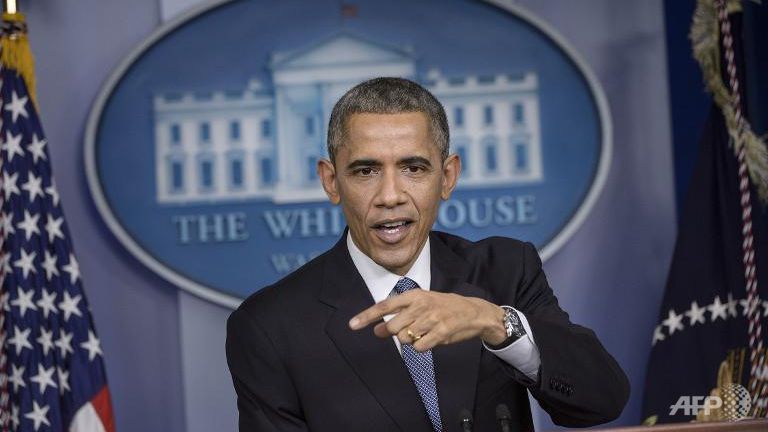Bolstered by economy, Obama takes on hostile Congress

US President Barack Obama. (Photo: AFP/Brendan Smialowski)
WASHINGTON: US President Barack Obama will on Tuesday (Jan 20) demand a hostile Congress increase taxes on the rich, in a State of the Union address that sets the stage for coming election battles.
Emboldened by faster economic growth, higher poll numbers and a string of political victories, Obama will outline tax plans that Republican opponents say are little more than class warfare. This will be Obama's first State of the Union address since Democrats lost control of Congress at last year's mid-term elections.
With Republicans in the majority, Obama is unlikely to win passage of his plan to pay for middle class tax cuts with hikes on the wealthy, but he can force Republicans to pay a political price for opposing him and appearing anti-poor.
Tuesday's address foreshadows the battles to come both in Congress and on the campaign trail, as Republican and Democrat hopefuls limber up for the battle to replace Obama at 2016 elections.
The president - now at the half-way point of his second term - is enjoying something of a resurgence and is battling to establish his legacy. A recent ABC/Washington Post poll saw Obama's approval rating increase nine points to 50 per cent, while 44 per cent thought he was doing a bad job, a 10-point drop in disapproval.
That is largely thanks to the improving economy. Unemployment has dropped below six per cent, the stock market is back near record levels, growth is at its highest in 11 years and gas prices have plummeted for motorists.
Even before the speech Obama's foes have accused him of using this bump in popularity to seek out wedge issues that split voters and rally Democrats.
"The American people aren't demanding talking-point proposals designed to excite the base but not designed to pass," said top Senate Republican Mitch McConnell on Tuesday. "They said they're ready to see more constructive cooperation, especially on bipartisan jobs initiatives."
The White House argues that Obama's plan is necessary because the "tax code is unfair, allowing the rich to play by different rules." "The 400 richest taxpayers paid an average tax rate below 17 per cent in 2012, lower than many middle-class families," the White House said in a briefing paper on the plan.
Under Obama's reforms, extra taxes on capital gains targeting just the wealthiest 0.1 per cent of people - those earning more than US$2 million per year - would generate 80 per cent of new revenue. "By ensuring those at the top pay their fair share in taxes, the president's plan responsibly pays for investments we need to help middle class families get ahead," the paper said.
This would notably be used to lower college fees for poorer students, but it was ridiculed by Republican budget hawks. "This is not a serious proposal," scoffed Brendan Buck, a spokesman for Congressman Paul Ryan, a former vice-presidential candidate and lead Republican budget negotiator.
"We lift families up and grow the economy with a simpler, flatter tax code, not big tax increases to pay for more Washington spending," Buck argued, in remarks echoed across his party.
EXECUTIVE AUTHORITY
In recent months Obama has used his executive authority - opponents would argue stretched it to the limit - to circumvent Republican opposition, imposing and opposing some policies by decree.
The new Congress has made one of its first priorities to approve the Keystone XL oil pipeline from Canada, an idea Obama has said he will veto out of hand if experts say it will damage the environment.
On the foreign policy front, he has announced moves to normalise relations with Cuba and pushed on with talks with Iran on its nuclear program, in defiance of conservatives.
Polls suggest Americans support the Cuban outreach and Obama will hammer home his advantage by inviting newly freed US citizen Alan Gross, a former prisoner in Cuba, to the speech.
Republicans have countered by inviting Rosa Maria Paya, the daughter of late Cuban dissident Oswaldo Paya, to underscore Cuba's poor human rights record.
Coincidentally - or not - the State of the Union falls the day before US envoys begin new talks in Havana on restoring ties, and Obama will push Congress to end the trade embargo. He won't get everything he wants, and much angry politicking lies ahead in the years before his next and last State of the Union speech.
What the stars mean:
★ Poor ★ ★ Promising ★★★ Good ★★★★ Very good ★★★★★ Exceptional
Latest News
More News
- 72 nations sign landmark Hanoi cybercrime convention (October 26, 2025 | 18:00)
- UN Secretary-General commends Vietnam’s global leadership (October 26, 2025 | 09:00)
- APEC finance ministers convene to tackle regional challenges (October 22, 2025 | 17:31)
- Rewiring global trade: ASEAN’s rise as supply chain hub (October 17, 2025 | 11:40)
- Vietnam attends first World Nuclear Week Forum in Russia (September 26, 2025 | 10:50)
- Vietnam attends 69th session of IAEA General Conference (September 16, 2025 | 10:00)
- ADB, WB pledge over 12 billion USD for ASEAN power grid, renewable energy projects (August 15, 2025 | 14:18)
- Lowy Institute proposes AI-based tobacco control solutions for ASEAN (August 15, 2025 | 14:14)
- Cloud computing policy to position Malaysia as regional hub by 2030 (August 15, 2025 | 14:11)
- Thailand, Cambodia suffer numerous cyber attacks (August 05, 2025 | 16:19)


















 Mobile Version
Mobile Version